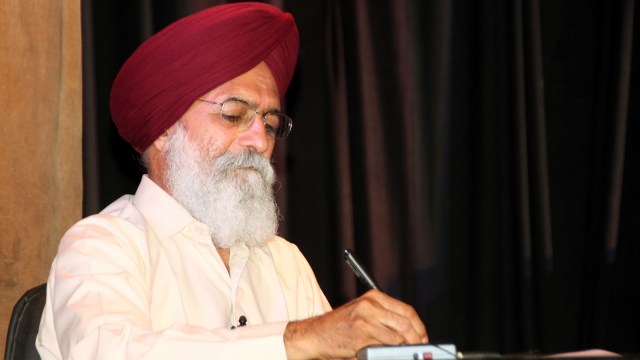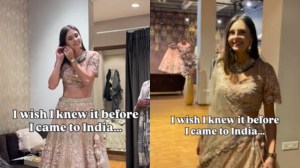Surjit Patar: The people’s poet
Punjab and Punjabi were the leitmotifs of Surjit Patar’s poetry and writings, that have stood witness to state's social, cultural, traditional and political milieu.
 Renowned Punjabi poet and Padma Shri Dr Surjit Patar who passed away early morning in Ludhiana on Saturday. (Express file photo by Gurmeet Singh)
Renowned Punjabi poet and Padma Shri Dr Surjit Patar who passed away early morning in Ludhiana on Saturday. (Express file photo by Gurmeet Singh)Eh Punjab koi Neera geographia nahi; Eh ik Geet, Ik Preet, itihaas vi hai; Rishiyan, Sufiyaan, Satguraan Srijia eh; Eh Ik falsafa, soch, Ehsaas vi hai; Kiney chakraan, toofana toe langyah eh; Ehda mukhda Kuj Udaaas vi hai; Ek din shaan is di suraj vang chamkoo; Meri aas vi hai, ardaas vi hai
Punjab and Punjabi were the leitmotifs of Surjit Patar’s poetry and writings, that have stood witness to state’s social, cultural, traditional and political milieu. Born in Pattar Kalan near Kapurthala, Punjab in January 1945, Patar carried with him the name, and ethos of his village, and in his lyrical verses, the hopes, aspirations, agonies, ecstasies of his people, and the traditions of the language. “His poetry was radical, revolutionary, set within nature, with a Sufiana touch, connected with the times. He was not an ivory tower poet, but a poet who was passionate, engaged, and politically aligned to humanistic values,” shares thespian Neelam Mansingh Chowdhry, who collaborated closely with Patar for decades on several theatre productions in Punjabi like Nagmandala, Yarma, Unposted Love Letter, and wrote the script of Kitchen Katha, Sibu in the Supermarket.
“It was in 1984, the height of militancy when I read his powerful poem, ‘Laggi nazar Punjab nu, edhi nazar utaaro. Le ke mirchaan kaurriyan, ehde sir ton waaro, sar ton waaro, waar ke, agg de vich saarro. Laggi nazar Punjab nu, edhi nazar utaaro… The words, imagery, layers of complexity were so powerful. I was fascinated and compelled to connect with this poet. And a month later, we met, and then began a journey of creativity. He gave credibility to my work, and I always say that translation is not an intermediary activity, but a creative act. He was a genius, his understanding and placement of words created a new narrative and grammar of expression, and he was a poetic playwright. Our relationship was unique, special, meaningful, and just getting to know him changed the course of my life,” recalls Chowdhry.
From the Left movement to the partition of Punjab, militancy in the state to female foeticide, the exodus of Punjab’s youth to the West, farmers’ struggles to drug abuse among the youth, loss of Punjabi language and the deterioration of songs and poetry of Punjab, Patar’s poetry and writings echoed with the concerns of his state and also universal themes of love, loss, environmental degradation, immigration. A Ph.D from Guru Nanak Dev University, Amritsar, he completed his education at Randhir College Kapurthala and Punjabi University Patiala, obtaining a Ph.D. in literature on the transformation of Folklore in Gurunanak Vani from Guru Nanak Dev University, Amritsar. He served as a professor of Punjabi at Punjab Agricultural University, Ludhiana, and was the president of Punjabi Sahit Akademi, Ludhiana, and the Chairperson, Punjab Arts Council, Chandigarh. Recipient of the Padma Shri (2012), Sahitya Akademi Award (1993), and Saraswati Samman (2009), Patar had dedicated his awards to Punjabi Language and Literature, often saying that he was taking forward the traditions started by Guru Nanak and Baba Farid. In December 2020, Patar announced the decision to return the Padma Shri, in support of farmers protesting the Centre’s farm laws.
Visual artist and photographer Diwan Manna, who was closely associated with Patar since 1985, describes him as one his own kind, an extraordinary poet, who comes once in a century, an intellectual, yet a people’s poet, concerned with the finest nuances of people’s problems, issues concerning the state, the working class, relationships and humanity. “The sensitive and fine human being that he was, his poetry was relevant to the times, he would cross timelines for he was a visionary and for me, his political poetry resonated with what we were living, and he reflected about contemporary times, how to save Punjabi, women’s status, immigration, the loss of inter-personal relationships. He was in a way lyricist, combined with a philosopher and used to sing his poetry, and even his walk reflected the music of his thoughts,” shares Manna, remembering a line where a son laments that it is difficult to return home, for his mother would dread that her son has outgrown her.
Indian contemporary poet Sudeep Sen says that Patar’s passing away is huge loss to Indian literature. “He was a rare person in the modern world, warm, scholarly, down to earth, gentle, his poetry was rooted in the Punjabi landscape, and the nuances of lyricism were unique. This is the loss of a renaissance man,” reflects Sen.
Patar believed art, poetry, culture, must be part of academics, and often spoke about it in seminars and his talks, saying that Punjab has no dearth of talent, but the talent needs the right direction, and this needs collective efforts. Art, poetry, music, he had once said, have the power to transform this world, and we as creative people have to stand up for what we believe in and introspect…
Mere andar chaldi hai ik guftagoo,
jithe lafzaan ch dhalda hai mera lahoo,
jithe meri behas hai mere naal he,
jithey waaris te purkhay kharhe roobaroo.







